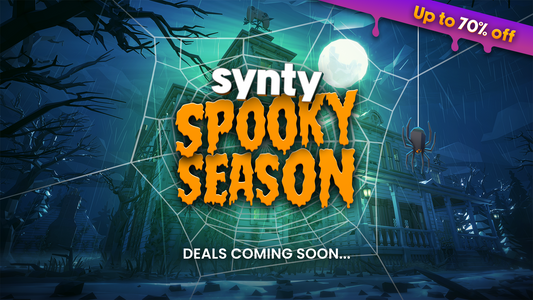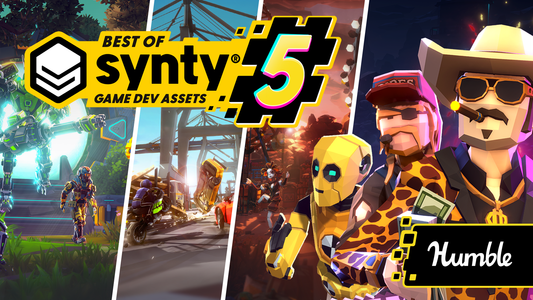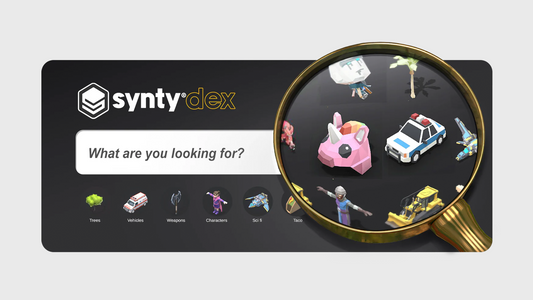 June is Men’s Mental Health Month – a time to talk about the things we often keep quiet.
June is Men’s Mental Health Month – a time to talk about the things we often keep quiet.
We want to shine a light on a topic that too often stays in the dark – mental wellbeing among men, especially in the game dev space. While it’s not always easy to talk about, mental health matters, and we believe open, honest conversations can make a difference.
A few weeks ago, we reached out to the wider Synty Community, as well as the men on our team, to share their experiences and how they manage stress and recharge. Whether that’s by picking up a controller, hitting the gym, diving into music, or simply taking a breather with a coffee.
We want to share some of the responses with you, in the hopes that you might feel less alone, and so you can maybe find some good advice to help your own wellbeing!
What are some of the biggest mental health challenges you’ve faced working in game development?
“Working in game development as a whole is a mental health challenge. Long hours, a constant thrive to be innovative and fun, the big market of competitors and all of this parallel to the job you have to do to make a living. Only passion keeps me at this, as there is no logical reasoning behind it.”
“Long hours, poor work-life balance, unstable income, aggressive/rude/demanding customers. The sheer scope and scale of modern gamedev - every skill is a bottomless rabbit hole that's always evolving.”
“Anxiety, fear of failure and judgement. Stress at solving problems.”
“The uncertainty in the market/industry. The past few years have been absolutely brutal coming out of the post-Covid boom, and not knowing if you'll have a job in 6-12+ months makes planning for the future really hard. It can be taxing mentally while planning for the future, especially when it comes to potentially buying a house in such an expensive market.”
“Games being cancelled and months or years of work wasted. Shifting design requirements meaning that your work all needs to be redone. Project timeline stress and needing to have something tangible to show for reviews each day.”
“Can be lonely. Both in geography and proximity to a physical community.”
“As a solo developer I often struggle with issues related to working alone, such as not having anyone around to bounce design off of, no one to help out with difficult technical problems, and generally no one there to validate the value of what I'm trying to develop. Motivation to work is less of an issue (I would say that I border on obsession) but keeping up a sense of "the value of the work" is a constant struggle.”
What strategies or habits have helped you maintain your mental wellbeing at work?
“Trying to look at the end result. As long as you know what you’re doing and where you’re aiming you will get there little by little.”
“Really feeling like I'm part of the team. Making the extra effort to help where necessary, always being there if someone needs a chat about more than just work, or help with problems. Taking breaks where needed if something is particularly challenging, and not being afraid to ask for help!”
“Separating work from personal life, getting away from the computer and going for a walk.
If you get sick a lot, you can get into a cycle where you avoid being active because you're sick, but the reason you're sick a lot is because you're not active and your immune system is suffering.”
“I take my dog for a walk every single day at lunch. Whether it’s raining, or snowing, or really windy, it doesn’t matter, a quick walk is better than no walk at all.”
“When things get tough I recenter myself. Thinking back to what I have been through and have overcome helps put things into perspective. The pause helps me come back with a fresh perspective.”
“Keeping track of my progress and achievements to better show myself the difference I'm making.”
Is there a game, creative outlet, or hobby that’s been especially helpful for your mental health?
“Music, specifically keyboard music. When I feel overwhelmed by a task or concept in dev, I switch gears and tackle a bit of Bach.”
“I play Ice Hockey, and I’m thankful to be able to play it all year round here (indoor rinks in the summer). That getting away from the computer and focusing NOT on screens really helps. And it's exercise!"
“Absolutely! I find working with my hands very relaxing, or focusing on a project that's a lot more physical seeing as I work at a desk so much. Whether it be LEGO, or doing puzzles, or drawing/sketching things. I've recently gotten into Warhammer Minis as well which have been a lot more challenging than LEGO!”
“Stardew Valley – at one point – because my family and I play together. For me, anything that connects me to a community that welcomes me and makes me feel included. Sometimes it's as simple as moving into a space where you're recognised and greeted by name. Local coffee shops are where I started feeling like I was anchoring myself in the community. Being greeted by baristas and local patrons started allowing me to feel connected.
Joining local workout groups who meet regularly has helped me immensely too, especially one where everyone is sharing a communal struggle. I can honestly say I've started to make my first real friends here after a few months (years) slowly by seeing the regulars. This sense of community built around exercise and a shared sense of suffering (because workouts suck, let's be honest :D) gives you a sense that you belong somewhere, are appreciated for not what you can contribute, but who you are.”
“Playing co-op games with friends, vs online team games helps. Being able to goof off, laugh and achieve objectives can make the worries disappear for a while.”
“From hobbies, going out every now and then into nature helps a lot, also maintaining social relationships. Creative outlets, do anything (not game development) that you like, writing, drawing, painting, etc."
What would you say to someone else in the games industry who’s struggling with their mental health?
“We are always toughest on ourselves, and we can be really insensitive to our own needs. Take a minute every hour to just remember that and to try and keep it all in perspective.”
“Never be afraid to ask for help, or set aside a mate for a serious conversation if you're struggling. There's not been a lot of good media or role models for men growing up and a lot of repeated messaging about "men just get over it, they push through, they deal with things silently" which has unfortunately caused a lot of men to take their own lives – seemingly out of nowhere – whenever people talk about who was just lost. It's okay to be sad, it's okay to cry, it's okay to talk about your feelings and your mates, friends and family will be so glad that you opened up to them and asked them for help. There's nothing wrong with being vulnerable, and men aren't meant to just take everything on the chin. Life can be hard, challenging, and brutal, but just talking about how you're feeling can be a big first step in making things better when times are tough.”
“Community is so important. But you need to find the right one. Beware of bad actors trying to place blame on certain groups as well as corrosive echo chambers. Find spaces that bring you peace and make. Diet and exercise. The future ‘you’ is worth investing in because you matter. Find something bigger than yourself to work towards. Be it religion, an ideal, family or whatever. Something out there needs you and your talents and skills.”
“Never be afraid to seek help. In big ways and little. Be ok to say when you need help or are feeling down. Don't bottle it up to face alone. We're stronger together.”
“Don't stress about being stressed. Recognize it. Embrace it. Give yourself permission to feel it. Then step back for a moment and try something that makes *you* feel better.”
“Take it one step at a time, if the pressure is ever too much – take a break. Seek refuge in the things that calm you as often as needed. In the moments where it seems too far gone, reach out to others.”

We want to thank everyone who so openly shared their stories and tips. Whether you're deep in development work, in between projects, or just trying to keep going – you matter! Let’s keep talking, supporting, and showing up for one another. If you’re keen to join a supportive community of thousands of professional and aspiring developers, be sure to jump into our Synty Community Discord server.
If you or someone close to you is going through a tough time, help is available. Find local helplines at findahelpline.com.
And remember! You are loved ❤️



